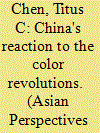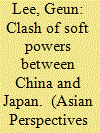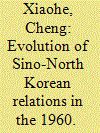| Srl | Item |
| 1 |
ID:
099602


|
|
|
| 2 |
ID:
099605


|
|
|
|
|
| Publication |
2010.
|
| Summary/Abstract |
This article argues that during the Six Party Talks on North Korea, China adroitly used its diplomacy to produce "soft-power synergy" while Japan became stuck with a "soft-power dilemma." Soft-power synergy refers to an outcome within which a success of an outward (foreign) soft-power strategy brings about simultaneous success of inward (domestic) soft-power strategy. On the other hand, soft-power dilemma denotes an outcome where a success of outward (or inward) soft-power strategy produces failure or negative influences in the inward (or outward) soft-power strategy. Borrowing from Robert Putnam's two-level game metaphor, this article tries to reveal the two-level dynamics of soft power by developing a refined conceptual framework of soft power and also by explicating a case study of Chinese and Japanese diplomacy at the Six Party Talks.
|
|
|
|
|
|
|
|
|
|
|
|
|
|
|
|
| 3 |
ID:
099604


|
|
|
|
|
| Publication |
2010.
|
| Summary/Abstract |
This article analyzes the impact of the East Asian economic integration regime on Taiwan's attractiveness as a destination for international investment as well as Taiwan's participation strategy. The results of the 1,019-sample questionnaire conducted for this study indicate that if Taiwan is excluded from East Asian economic integration agreements, 26 to 35 percent of the domestic and foreign enterprises included in the survey would reduce their investment in Taiwan. If Taiwan participates in an East Asian economic integration agreement, 23-37 percent of the enterprises would increase their investment in Taiwan. Thus, for the companies in the survey, the complete net investment effect of participation in the regime minus that of exclusion is between 49 and 72 percent. If Taiwan and China were to sign an economic integration agreement, 30-41 percent of the enterprises surveyed would increase their investment in Taiwan. Furthermore, the consensus among the enterprises in the survey is very clear and strong: Taiwan should give top priority to concluding economic integration agreements with China and the United States and any such agreements should preferably be comprehensive and multi-functional.
|
|
|
|
|
|
|
|
|
|
|
|
|
|
|
|
| 4 |
ID:
099607


|
|
|
|
|
| Publication |
2010.
|
| Summary/Abstract |
The evolution of Sino-North Korean relations is an interesting historical phenomenon worth careful reexamination. The diplomatic documents recently declassified by the Chinese government shed new light on this old issue. Based on previous research and new information, the author finds that Sino-North Korean relations were closely related to Soviet-North Korean relations: The two sets of bilateral relations ran in opposite directions. Moreover, the rise and fall of North Korea's relations with China were determined by the political division on the Korean peninsula and Sino-Soviet polemics, and in the competition for influence between ideological and security concerns, the latter won out. Throughout, North Korea was not weak; it was in control of its relations with its two major allies.
|
|
|
|
|
|
|
|
|
|
|
|
|
|
|
|
| 5 |
ID:
099606


|
|
|
|
|
| Publication |
2010.
|
| Summary/Abstract |
he United States government has contributed food aid to North Korea nearly every year since 1996. This article breaks down the assistance into three phases: the initial phase, when DPRK-U.S. tension began over the monitoring protocol; the second phase, with increasing congressional pressure to make further assistance contingent on improved monitoring; and the third phase, in which U.S. concerns over monitoring were partially addressed. The article explores various, possibly overlapping, explanations for U.S.-DPRK disagreement over monitoring protocols, such as different expectations and cultural learning curves. It concludes with recommendations for the U.S. government to explore food-security programming in the DPRK and to reconsider the laws and theories guiding U.S. aid to countries with which the United States does not have diplomatic relations. The article also draws from U.S. nongovernment organization programming in comparison with the U.S. government experience.
|
|
|
|
|
|
|
|
|
|
|
|
|
|
|
|
| 6 |
ID:
099603


|
|
|
|
|
| Publication |
2010.
|
| Summary/Abstract |
This article examines party institutionalization in Hong Kong in order to understand the development of political parties in a political system undergoing democratization. Party institutionalization is defined as the extent to which political parties develop a systematic set of mechanisms and structures that enable them to compete effectively for political power. By examining partisanship, autonomy, and the stability of political parties in Hong Kong, the author concludes that party institutionalization is still weak, although there are signs of progress. Constitutional constraints, structural factors, lack of public support, and the problem of adaptation pose serious obstacles in the party institutionalization process. Political parties, as one of the essential conditions for democratic consolidation, have brought a new page of democratic politics to Hong Kong. However, in terms of institutionalization, political parties in Hong Kong are far from mature, thereby limiting their impact on the democratization process.
|
|
|
|
|
|
|
|
|
|
|
|
|
|
|
|